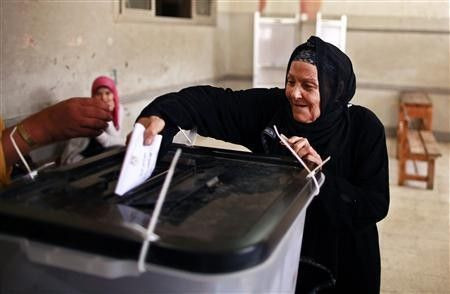No More Good Men: Egypt?s Presidential Candidates Leave Women In A Quandary

During the final days of Hosni Mubarak's regime in Egypt in early February of 2011, Cairo was humming with energy. Marches and rallies filled the streets, and the public was electrified by a new sense of efficacy.
Mubarak stepped down on Feb. 11 last year, making the victors of the revolutionaries. But for one-half of Egypt's population, the movement's success was about much more than regime change.
It's the first time I felt that men and women are equal in this country, Engi Mahmoud, 16, told the Los Angeles Times. I'm happy not to feel inferior for once.
On the crowded streets of Cairo before Mubarak was deposed, women knew to expect harassment from time to time; It was common, even tolerated. But during the protests, that seemed to change. Females marched side by side with males, suddenly afforded a higher degree of respect.
Many women marveled at the welcome change. Among them was Rihab Assad, an office manager who witnessed a woman wielding a megaphone in front of a crowd. All of these men just chanting after her, repeating what she said ... To me, this was something entirely new, she said.
Also among them was Reem Hatem, who lives in Giza. I was brought up to believe I was powerless, she told the L.A. Times. But this was a chance to send a message that no, we're not weak and sitting at home and being afraid. This is a way of telling men something.
Those encouraging words were spoken more than a year ago; now, things are different. Many of Egypt's women have reported that the parity they enjoyed during the revolution vanished just as quickly as it came.
Today, women are encountering antagonism from two sides. The newly emerging Islamist-dominated government threatens gender-equality reform, while the Egyptian military -- the power maintaining control during the country's transition -- seems to have no concern for women's rights.
Now it looks as if the runoff vote for Egypt's first-ever legitimate presidential election will reflect that very dichotomy.
From Both Sides Now
In the government, male Islamist politicians are poised to dominate policy.
A new parliament was elected in January, and among the 778 seats in both houses -- 90 of which still remain vacant pending the future president's appointment -- only nine are filled by women. Members of the Freedom and Justice Party, an Islamist party representing the pan-Arab Muslim Brotherhood, dominated the parliamentary elections.
Mozn Hassan, who heads a Cairo-based organization called Nazra for Feminist Studies, is concerned about Islamists' support for sharia law. A strict adherence to those rules could relegate Egypt's women to a supporting role in society. Hassan told the GlobalPost that she has been working to increase awareness of women's rights, but sees the new government dragging its feet.
I hoped they would discuss [women's] issues in parliament, but instead they discuss our age of marriage, Hassan scoffed, referring to recent efforts to lower the age at which girls can legally wed.
Meanwhile, the ruling military has also had a poor showing on women's issues. In their attempts to quell unrest that has continued since the revolution, security personnel working on behalf of the Supreme Council of the Armed Forces, or SCAF, have been accused of directing unnecessary violence toward female protesters on several occasions.
Hassan described the situation succinctly: Even if Islamists are aggressive in their decisions regarding women's rights, the military does not even see us.
More Of The Same
In light of this predicament, projected results on Friday of Egypt's first round of presidential-election voting are troubling. The early count shows that the country's likely runoff contestants are Mohammed Morsi, who represents the Muslim Brotherhood's Freedom and Justice Party, and Ahmed Shafiq, who is favored by SCAF and served as as air-force commander under Mubarak.
In other words, women may now have to choose between an Islamist and a military man.
Many Egyptian feminists had pinned their hopes on a more liberal candidate -- among the presumed front-runners, Amr Moussa had represented their best bet. This former foreign minister has no link to the Muslim Brotherhood. And although he served under Mubarak, he is not as strongly linked to the old guard as is Shariq. Another losing front-runner, Abdel Moneim Aboul Fotouh, is Islamist, but he represented a more moderate approach than does Morsi.
In what is now gearing up to be a polarizing presidential battle, women who are concerned about equal rights may be forced to choose the lesser of two evils.
The stakes are high, but exactly how high is anyone's guess. Presidential powers are not yet fully defined since Egypt has so far failed to put together a constitution.
The 100 members of the Constituent Assembly, responsible for drafting Egypt's post-revolution constitution, were appointed in March. But the assembly, dominated by male Islamists, was quickly criticized for its lack of diversity. It was suspended by the courts in April, and concerns still linger as to how inclusive and democratic the constitution will be.
In short, there is much still yet to be determined as Egypt's government continues its halting journey toward stability. First-round presidential-election results show that either a SCAF ally or a Muslim Brotherhood member is likely to man the helm -- but if a functioning democracy is the final destination, gender-rights advocates can look ahead with hope.
For now, feminists like Hassan will work for change at the grassroots level.
I'm against the idea of victimizing women, Hassan told the GlobalPost. You are in a patriarchal society; they already see you as victims. But if we are subjected to violence, we are not looking to be consoled. We are aiming to empower ourselves and to be in positions that would allow us to put an end to these problems.
© Copyright IBTimes 2025. All rights reserved.






















